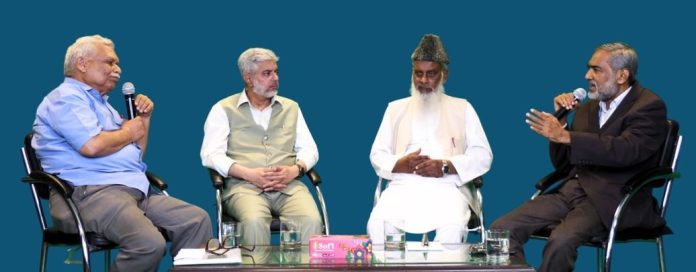New Delhi: A group discussion was organized here Friday to discuss the recent circular related to madrasas issued by the Uttar Pradesh government. It discussed the political and legal aspects of protecting madrasas. The discussion included participation from Maulana Mohammad Tahir Madni, former Rector of Jamiatul Falah, Bilariaganj, Azamgarh; Dr. Salman Asad, Chairman of Jamia-Tus-Salehat, Rampur; Mr. Haseeb Ahmed, former civil service officer; and Syed Tanveer Ahmed, Secretary, Markazi Taleemi Board.
During the discussion, various challenges faced by madrasas and their current state were deliberated. The key points of the discussion are as follows:
- Social and Political Relations:
The participants emphasized the need for madrasas to establish strong relationships with influential figures in society, political leaders, and the administration. This act would help highlight the services and contributions of madrasas. Through these efforts, intellectuals from other communities, the media, and senior government officials can be made aware of the work of madrasas, what is taught there, and how their graduates contribute to society and the country. Additionally, the misunderstandings related to Islam, Muslims, and madrasas that have become widespread can be addressed.
- Compliance with Educational Laws:
Participants advised madrasas to adhere as much as possible to educational laws regarding registration and relations with authorities. They also suggested that madrasas should arrange the teaching of modern subjects under any registered board up to class 10. It was clarified that it is feasible to integrate modern education with religious studies. For example, under the UP Board, madrasas can teach three languages, science, mathematics, and social studies. Many madrasas already teach three languages, as well as mathematics and science, while social studies are often taught under general knowledge, meaning that students won’t be overly burdened.
If teachers are experts in their subjects, the curriculum can be completed by teaching science three days a week and mathematics on the other three days. Since many madrasas are residential, time shouldn’t be a major issue. The discussion also included reviewing the curriculum, improving infrastructure, and enhancing teacher training to raise the quality of education.
- Legal Recourse:
Under the Constitution of India, minorities have the freedom to establish and manage their educational institutions. If any government attempts to deprive minorities of this right, it would be an unconstitutional act. Therefore, participants suggested that first, meetings should be held with responsible government officials to clear their misconceptions regarding madrasas. The government should be advised to take an objective look at madrasas. If the government is sincere about improving and reforming madrasas, it can work alongside madrasa administrators to implement reforms. However, the current attitude of the government suggests that it views madrasas through a biased lens. If the government takes unjust actions, minorities’ last recourse in a democracy would be the courts.
- Improvement in Educational Standards:
To elevate the educational standards of madrasas, it is necessary to adopt modern educational parameters, which include skill development programs, scientific subjects, and modern teaching methods. Additionally, teacher training, management training, the training of students’ guardians, and student counseling should also be included in these efforts.
The participants agreed that effective reforms could only be achieved through mutual cooperation between the government, society, and madrasas. They proposed the establishment of a coordination committee to address issues related to madrasas and to assist in decision-making.
At the conclusion of the meeting, it was made clear that the government should not create fear and panic through unnecessary and misguided interference in madrasas. These are welfare institutions dedicated to societal development, and they provide education to children whom the government is unable to reach.
While these madrasas contribute to societal development, they also assist the government by educating children from weaker sections of society.




